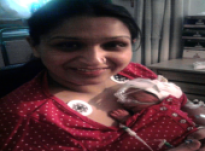Farkhanda

More about me...
Visiting her son was the highlight of Farkhanda's days. She really appreciated the help staff...
Visiting her son was the highlight of Farkhanda's days. She really appreciated the help staff...
Farkhanda's baby was a week old, and she was still in the high dependency. She was supported by...
Farkhanda's baby was a week old, and she was still in the high dependency. She was supported by...
Farkhanda was still in intensive care on lots of drips and painkillers, but was determined to see her son. She was given lots of support by the staff to go and visit him.
Farkhanda was still in intensive care on lots of drips and painkillers, but was determined to see her son. She was given lots of support by the staff to go and visit him.
Farkhanda found the transfer from high dependency very difficult but soon she was able to do things for herself and sit in a wheelchair to go and see her baby.
Farkhanda found the transfer from high dependency very difficult but soon she was able to do things for herself and sit in a wheelchair to go and see her baby.
Farkhanda was in intensive care and it was 7 days before she could go and visit her son in special care for the first time. It was very emotional.
Farkhanda was in intensive care and it was 7 days before she could go and visit her son in special care for the first time. It was very emotional.
Farkandha who was very ill with placenta percreta (a condition in which the placenta invades the womb wall) and in hospital for many weeks, said that the experience has made her relationships with her sisters stronger.
Farkandha who was very ill with placenta percreta (a condition in which the placenta invades the womb wall) and in hospital for many weeks, said that the experience has made her relationships with her sisters stronger.
And mentally the only impact that it’s had is that it’s made us stronger Our belief is stronger, we value our relationships more, not just me, others round me. My sisters they are forever saying, “We learnt the hard way. We learnt the hard way what it really means.” And my sisters, the way they rallied around. One of my sisters, the one I call PA, she spent most of her time in the hospital, before and after surgery. She left a three month old baby at home. She was breastfeeding her baby. And for me, for a Mother leave a three month old nursing baby at home to care for me. I mean how else can you show your love? There’s nothing more powerful than that. And the baby was then cared for by my sister. It may have been just three weeks, but within that three weeks, this baby had to stop breastfeeding, yes, you know, so it’s the powerful things like that, really you know, and you know, my husband can’t, he can’t stop saying enough times, he will just say, “If you died, I would have taken the boys and I would have moved away so far, where I’d never remember you because I wouldn’t be able to live with that pain.” I was thinking, oh God you work in mysterious ways. Thank goodness he didn’t do that, because my Mum would miss my boys [laughs]. And I wouldn’t have you know, no say in that, that was probably beyond [laughs].

